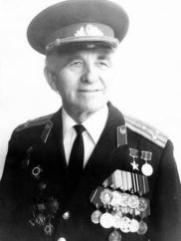Grigory Gonchar (né Gensher) was born in Yelisavetgrad (present-day Kropyvnytskyi, Ukraine) in 1916. He was the eldest of six children.
His father, Moisei Gensher, was a cobbler by trade. In the 1920s, he owned a small workshop, which he was forced to close down at the end of that decade, following increasing official pressure on the private sector. Afterward, he had to work as an ordinary cobbler.
After finishing an eight-year school, Grigory Gensher found a job as a mechanic at the Krasnaya Zvezda factory in Kirovograd, and this improved his social standing – his father's being a workshop owner was incompatible with the Soviet value system.
In 1937, Grigory Gonchar (who had discarded his original last name by that point) joined the Red Army. In 1939, he attended the Military-Political School in Moscow, and a year later he completed a course for commanders of regimental schools. Afterward, he served as the political commissar of a regimental school in a rifle division stationed in Stalinogorsk (present-day Novomoskovsk, Tula Oblast).
At the time of the outbreak of the Soviet-German War, Grigory Gonchar was serving in the area of Mogilev, and he actively participated in the war from its first days. His regiment was visited by the famous military correspondent and writer Konstantin Simonov, who would later describe these events in the trilogy The Living and the Dead (1959).
By late June 1941, German troops were already closing in on Mogilev, yet the Red Army was offering determined resistance in this sector. Grigory Gonchar was wounded in one of these heavy battles, and taken to a hospital. However, a few days before the occupation of Mogilev by the Germans, Grigory was able to literally crawl out of the hospital, and this saved his life. He hid for two weeks in the residence of a local woman. After regaining some of his strength, Grigory, who did not wish to put her in further danger, set out for home – to Kirovograd, which lay almost 400 kilometers from Mogilev, across German-occupied lands. Gonchar traveled mostly after dark. Upon reaching the city, he found a bomb crater instead of his home, and his neighbors advised him to flee.
Shortly thereafter, Grigory Gonchar joined the Stalin partisan unit, which was active in Cherkasy Oblast. For a time, he worked as a clerk, since the unit commander, who knew what the Germans were doing to Jews, wished to protect him. However, Gonchar was dissatisfied with this state of affairs, and he yearned to see action. In the end, Grigory and his partner brought down a German aircraft during a reconnaissance assignment. They were then able to retrieve a machine gun and some small-caliber cannons from the fallen aircraft, and bring these weapons back to the partisan unit.
In 1943, Cherkasy Oblast was liberated. In those days, Gonchar was wounded in action and hospitalized yet again. He was subsequently investigated by SMERSH, the Soviet counter-intelligence agency, since the Soviets refused to believe that a Jewish political commissar could have survived in occupied territory or in German captivity – ergo, he must be a spy. As punishment, Gonchar was ordered to lead a penal company, which consisted mostly of criminals, to the front lines. Grigory Gonchar accomplished this task, and he was then restored in the rank of first lieutenant and appointed commander of a rifle company.
Gonchar went on to take an active part in the fighting in Ukraine, Moldova, and Romania. In one engagement in the area of Chișinău, the strike team under Gonchar's command broke through the enemy defenses, thereby allowing the Soviet tanks to join the battle. For this operation, he was awarded the Order of the Red Star.
Grigory Gonchar was wounded a total of seven times, and his last injury was particularly severe. This happened in January 1945, during the crossing of the Oder River in Poland. While the Soviet forces were enlarging the captured bridgehead, Gonchar sustained a very severe wound, but went on fighting. He was rescued by an orderly, who carried the wounded Gonchar across the ice to a hospital base in the rear. Gonchar remained hospitalized until the end of summer 1945. In April 1945, Grigory Gonchar was awarded the title of Hero of the Soviet Union. His relatives, who had lost contact with him at the very beginning of the war, learned that he was still alive from the announcement of this award in the newspapers.
After recovering, Gonchar was sent to Ivano-Frankovsk in Ukraine. There, he took part in establishing a pedagogical institute, and then a medical institute, and he went on to work in the military departments of both institutes.
In 1957, Grigory Gonchar completed the "Vystrel" officer training course, whereupon he became a regimental commander. In 1961, he was transferred to the reserve, since he was still suffering from the effects of his war wounds.
After returning to Ivano-Frankovsk, Grigory Gonchar worked for many years as teacher and principal of an automotive technikum.
Grigory Gonchar died in Ivano-Frankovsk in 1998.







